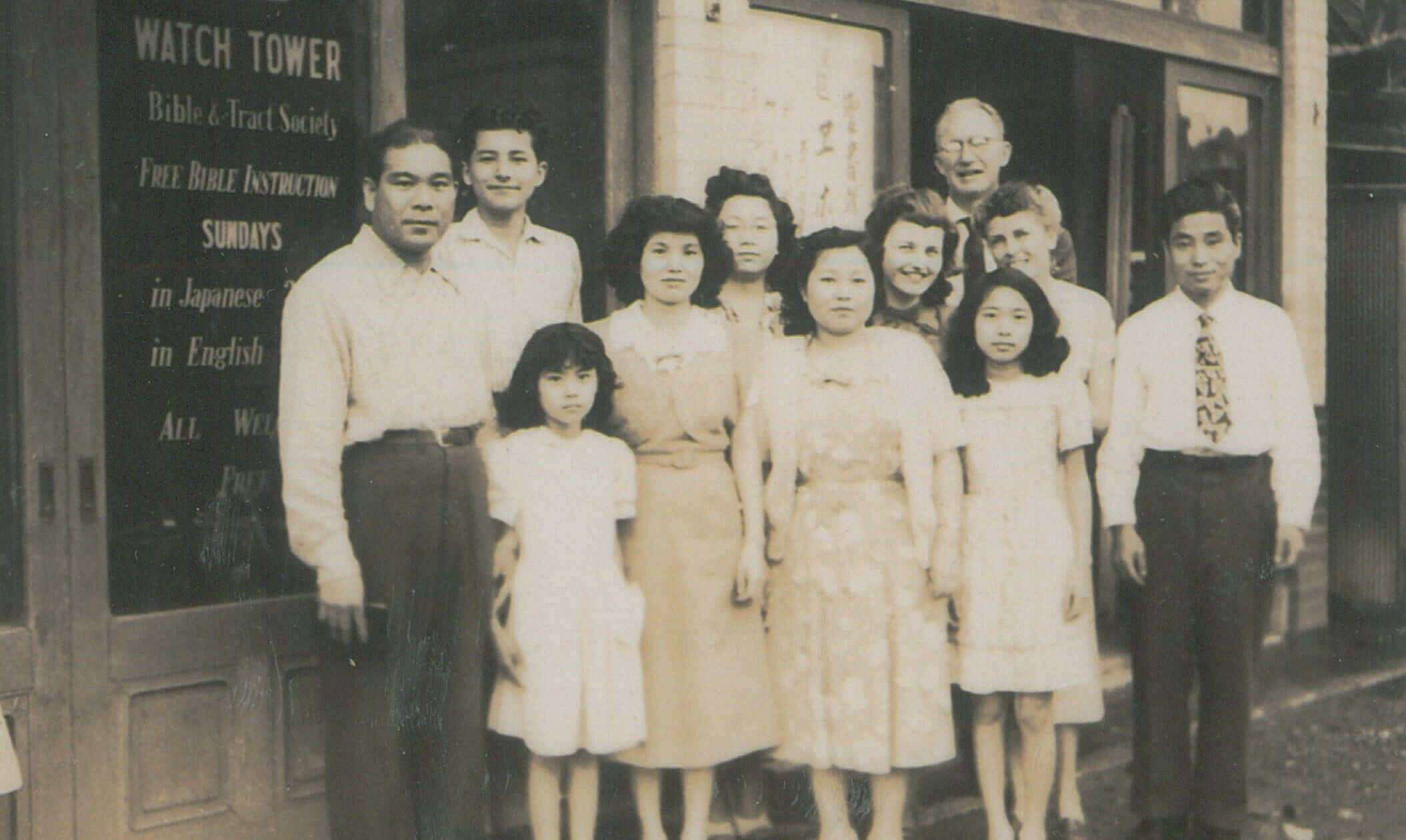Jehovah’s Witnesses in Japan
Local History of Jehovah’s Witnesses
Jehovah’s Witnesses have been present in Japan for almost 100 years.

1913
A Japanese person becomes a Witness in the United States and returns to Japan.
The first convention is held in Osaka in 1927.

1927
First branch office is established in Kobe, later it is moved to Kyobashi, Tokyo.

1949
First missionaries arrive in Japan.

1949
Branch office is moved to Mita, Tokyo.

1953
Watchtower Bible and Tract Society is registered in Japan as a religious corporation.

1972
Branch office is moved to Numazu, Shizuoka.

1982
Branch office is moved to Ebina, Kanagawa.

1982
New World Translation of the Holy Scriptures is released in Japanese.

2000
Supreme Court rules that forced blood transfusions violate patients’ rights.

2025
Approximately 214,000 Witnesses are active in Japan.
Disaster Relief Efforts

Jehovah’s Witnesses place a high priority on disaster preparedness. When disasters strike, they are prepared to take immediate action to provide practical assistance as well as ongoing emotional and spiritual support.
When the Great East Japan Earthquake occurred in 2011, the Witnesses delivered food, water and fuel to victims within one day. Within two days, three Disaster Relief Committees had been formed. Witnesses throughout Japan offered temporary accommodations to survivors. Witness volunteers repaired 970 damaged homes and distributed furniture, appliances and household goods.
Over the years, Jehovah’s Witnesses have been actively engaged in relief work in Japan.
In 2024, after the 7.5 magnitude earthquake rocked Noto Peninsula, Jehovah’s Witnesses have been organizing relief efforts in Ishikawa, Niigata, Toyama prefectures to help their fellow believers and their neighbors. In the first two months, over 3,000 Jehovah’s Witnesses have volunteered in the efforts.
The earthquake mainshock hit on January 1, 2024, and Jehovah’s Witnesses organized a Disaster Relief Committee as early as January 2, 2024. The committee began distributing necessary relief supplies such as water, food, and clothing. Once it was safe to do so, the Witnesses began the ongoing efforts to repair damaged homes.
A house of worship, called a Kingdom Hall, located in Suzu City has been designated as an area for evacuation to provide shelter and relief for injured individuals. One woman who found shelter in the hall stated, “This place saved my life.”
Other examples can be found on the official website of Jehovah’s Witnesses, www.jw.org.
Earthquake in western Japan in July 2018
(“Witnesses Bring Relief to Flood Victims in Japan.”)
Earthquake in Kumamoto on April 14 and 16, 2016
(“Witness Volunteers Repair Over 300 Homes Following Japan Earthquakes”)
Mudslides in Hiroshima on August 20, 2014
(“Witnesses Assist Victims of Hiroshima Mudslides”)
When an earthquake hit Kumamoto in 2016, Mr. Minoru Kono, a former official with Japan’s Self-Defense Forces who observed the Witnesses’ relief construction work, stated: “In my line of work, urgency is of utmost importance in order to save lives. Jehovah’s Witnesses had the same urgency after the Kumamoto earthquake, as they quickly rushed to the affected area to help victims. And when the Witnesses began their relief construction work, I was surprised to see, not amateurs, but skilled construction workers coming from all over Japan to assist with the work. The Witness volunteers are extremely devoted and hardworking.”
Sharing Their Beliefs
Jehovah’s Witnesses respect that each individual has his own beliefs and opinions. The Witnesses modestly present what the Bible says, recognizing that each person has the right to choose what he or she will believe.
Like all parents, Jehovah’s Witnesses want the best for their children. They take seriously their responsibility to provide religious education for them and teach them to live by moral principles. As is internationally recognized, parents have the right to educate their children in conformity
with their own convictions. However, when the children grow older, they must decide for themselves if they will become Jehovah’s Witnesses.
This is in harmony with the liberty of parents protected by Article 18, Clause 4 of the International Covenant on Civil and Political Rights, and Article 14, Clauses 1 and 2 of the Convention of the Rights of the Child.
International Covenant on Civil and Political Rights: Article 18.4: “The States Parties to the present Covenant undertake to have respect for the liberty of parents and, when applicable, legal guardians to ensure the religious and moral education of their children in conformity with their own convictions.”
Convention of the Rights of the Child: Article 14.1 and 2: “1: States Parties shall respect the right of the child to freedom of thought, conscience and religion. States Parties shall respect the rights and duties of the parents and, when applicable, legal guardians, to provide direction to the child in the exercise of his or her right in a manner consistent with the evolving capacities of the child.”
